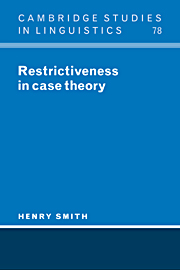6 - Changes in linking
Published online by Cambridge University Press: 04 November 2009
Summary
In this chapter I would like to turn to the diachronic consequences of the theory outlined in the previous chapters. I intend to show that the approach to linking based on restrictiveness provides an elegant way to state generalizations about the relative likelihood of changes. The Optimality Hypothesis introduced in the last section of the last chapter defines what a local simplification would be: the lowering of the restrictiveness of linkers applying to a given argument. If change in linkers is local simplification, then we can, by way of the Optimality Hypothesis, identify decreases in the restrictiveness of linkers applying to arguments as the likely changes.
The organization of this chapter is as follows. First, I will consider some of the issues raised in some previous work on change in linking. Then, I will return to the topic with which I began Chapter 2, case alternations. Like much, if not all variation, the case alternations are changes in progress. In §6.3 I will lay out the predictions the restrictiveness-based approach to linking makes for linking change. Then I will show that the diachronic side of the case alternations is exactly what is expected on this view. I will then turn to a more general consideration of the consequences of the theory and provide an account of linking changes in Scandinavian in particular. Finally, I will consider the general character of changes in linking.
Previous work on linking change
Previous work in case change has raised three major issues that I would like to address in this chapter in the context of the restrictiveness-based theory of linking.
- Type
- Chapter
- Information
- Restrictiveness in Case Theory , pp. 221 - 258Publisher: Cambridge University PressPrint publication year: 1996



